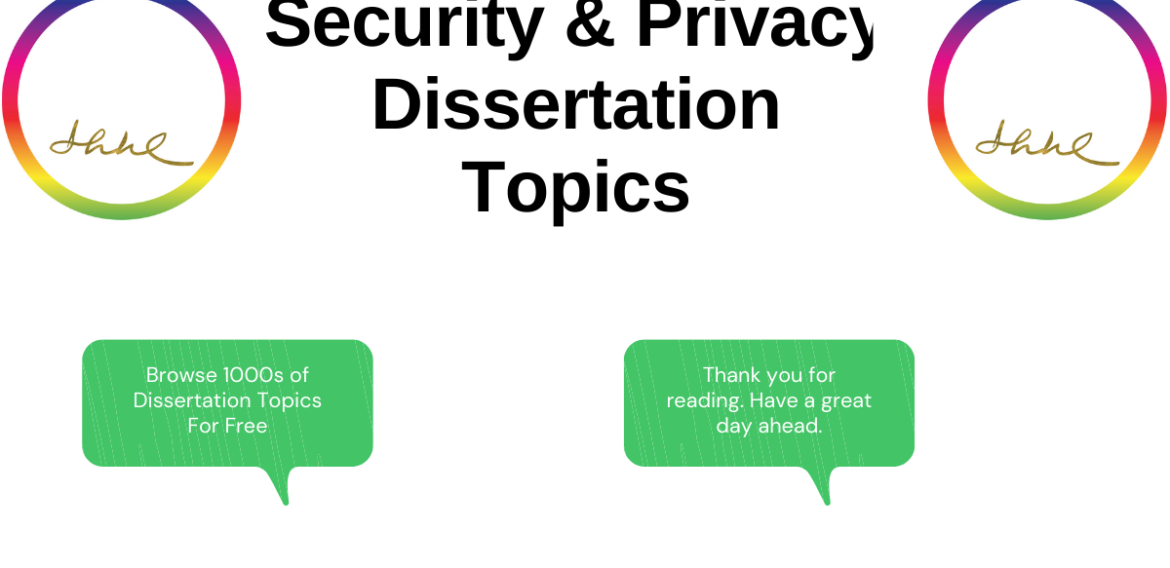Security Privacy Dissertation Topics
Over the last decade, the amount of data stored or transferred between systems, users, and organisations has increased dramatically. Additionally, data sharing between networks and public cloud platforms has accelerated significantly. Attackers on networks and online are constantly looking for new ways to gain unauthorised access to such data, which has resulted in an increase in security and privacy concerns. When an organisation is subjected to a cyber attack, they face a variety of challenges. Additionally, it is a vast and diverse field of law that is constantly evolving to keep pace with technological advancements. By the end of May 2018, the new General Data Protection Regulation (GDPR) will take effect, imposing a slew of new requirements on businesses regarding the collection and storage of personal data, as well as implications for data privacy. We’ll examine ten security privacy dissertation topics on data privacy, beginning with the most popular.
Editingarsenal has compiled a list of some of the most popular and common dissertation topics from a variety of academic disciplines, so you can pick and choose what to write about. If you need dissertation editing assistance , don’t hesitate to contact one of our qualified and experienced editors and proofreaders.
Data Security and Privacy Issues
- The proliferation of smart devices such as smartphones and laptops has spawned a new phenomenon known as “bring your own device,” in which employees use their own personal devices to complete tasks or processes at their place of employment. Due to the fact that employees carry their devices with them wherever they go, this approach raises serious concerns about the security and privacy of corporate data, while also increasing the risk of unauthorised access. I intend to use this dissertation to assess the impact of BYOD on data security and to recommend security policies that can assist businesses in more effectively implementing a secure BYOD structure.
Big Data In Healthcare
- As with other business sectors, healthcare organisations have digitised their patients’ medical records. As a result, the total volume of data in health services is increasing in terms of density, multiplicity, and accuracy. On the other hand, patient confidentiality and privacy have become significant concerns in recent years, as evidenced by numerous data breaches at healthcare organisations. Patient privacy concerns, as well as the best security policies that healthcare organisations can implement to prevent data breaches, will be evaluated.
Cloud-Based ERPs
- Businesses are increasingly reliant on cloud-based systems such as ERPS, which enable them to perform a variety of processes more efficiently and reliably. While cloud computing has numerous advantages, it also introduces security risks for businesses. In this dissertation, we will assess the relevant security vulnerabilities of cloud-based ERP systems and then propose a novel conceptual framework for enhancing the security structure of organisations that use cloud-based ERPs.
Cyber Attacks on Organizations
- To avoid cyber attacks, organisations must address a variety of issues. The purpose of this dissertation is to examine how organisations attempt to ascertain the causes of attacks, particularly those directed at their own employees. Its objective is to ascertain how businesses safeguard their technology against cyber threats.
Employee Training For Possible Attacks
- Employees play a critical role in cyber attack prevention. The purpose of this dissertation is to examine how organisations educate their employees about cyber security threats. Additionally, it aims to establish a process for developing and empowering staff to work in a technologically secure culture.
Personal and Organizational Data Privacy
- The Internet and web security are constantly under attack by private individuals and businesses alike. This dissertation will examine account hacking and insecure cloud services in order to identify all potential threats to data security. Additionally, the dissertation seeks to quantify the costs of security breaches, such as blackmail, money theft, and identity fraud, on both individuals and organisations.
GDPR Impact on Data Privacy
- This discussion will focus on the GDPR and the changes that have been made. Depending on the length of the dissertation, you may include several changes or concentrate entirely on one that will have a significant impact on social networks, such as changes to data use and consent (Article 4 of the GDPR). Recent events, such as the Cambridge Analytica scandal, would be appropriate to include in order to evaluate the impact of this change on Facebook and whether it could have been avoided.
Lessons From Cyber Attacks
- Cyber attacks have been a constant feature of the news for the last three decades. Why are these attacks occurring, and how can they be prevented in the future, given what we now know? This dissertation will examine the most significant cyber attacks over the last two decades, from 1998 to 2018. Recommendations will be made to assist individuals and organisations in remaining safe in the future based on what is learned about how these attacks occurred.
Data Privacy Legislation
- This dissertation will examine the history of data privacy and the enactment of various pieces of legislation. Additionally, it will examine the new General Data Protection Regulation (GDPR) to determine whether it strikes the appropriate balance between privacy protection and innovation. Additionally, focusing on a specific area, such as research, where the GDPR has made significant advancements in terms of processing and consent, would be beneficial (Article 6). (4) Recital 159 of the GDPR also defines research broadly.
Data Protection and Data Privacy
- The General Data Protection Regulation (GDPR) aims to increase individuals’ online safety and data security. Numerous rights are protected, including the right to erasure of personal data and the right to object to processing. Individual rights would be examined, as well as how businesses and institutions would cope with increased obligations. Additionally, the dissertation will examine the difficulty inherent in this and the risk inherent in failing to ensure compliance with these obligations, e.g., severe fines.







